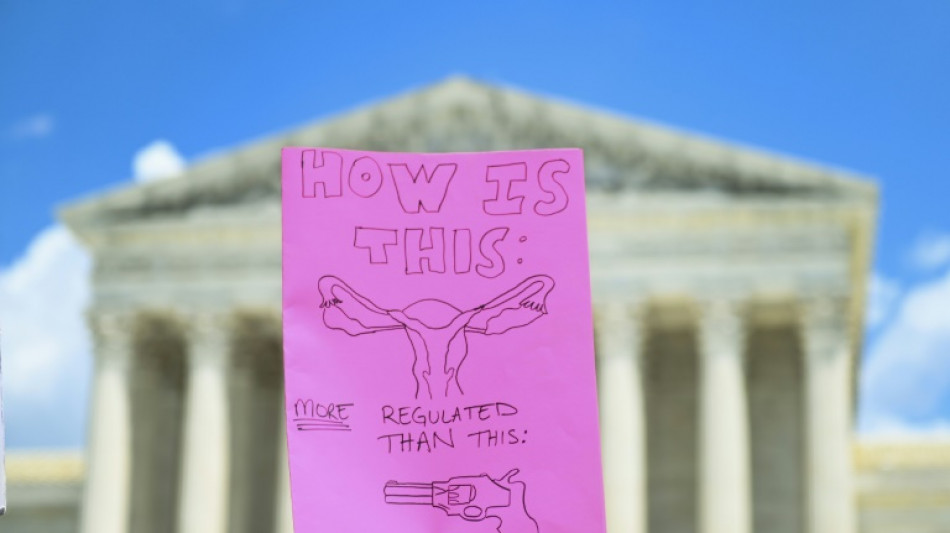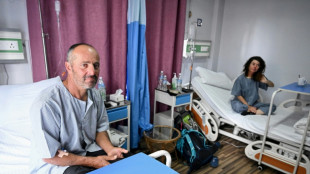
-
 Pakistan's Rauf and Indian skipper Yadav punished over Asia Cup behaviour
Pakistan's Rauf and Indian skipper Yadav punished over Asia Cup behaviour
-
Libbok welcomes 'healthy' Springboks fly-half competition

-
 Reeling from earthquakes, Afghans fear coming winter
Reeling from earthquakes, Afghans fear coming winter
-
Ronaldo reveals emotional retirement will come 'soon'

-
 Munich's surfers stunned after famed river wave vanishes
Munich's surfers stunned after famed river wave vanishes
-
Iran commemorates storming of US embassy with missile replicas, fake coffins

-
 Gauff sweeps Paolini aside to revitalise WTA Finals defence
Gauff sweeps Paolini aside to revitalise WTA Finals defence
-
Shein vows to cooperate with France in probe over childlike sex dolls

-
 Young leftist Mamdani on track to win NY vote, shaking up US politics
Young leftist Mamdani on track to win NY vote, shaking up US politics
-
US government shutdown ties record for longest in history

-
 King Tut's collection displayed for first time at Egypt's grand museum
King Tut's collection displayed for first time at Egypt's grand museum
-
Typhoon flooding kills over 40, strands thousands in central Philippines

-
 Trent mural defaced ahead of Liverpool return
Trent mural defaced ahead of Liverpool return
-
Sabalenka to face Kyrgios in 'Battle of Sexes' on December 28

-
 Experts call for global panel to tackle 'inequality crisis'
Experts call for global panel to tackle 'inequality crisis'
-
Backed by Brussels, Zelensky urges Orban to drop veto on EU bid

-
 After ECHR ruling, Turkey opposition urges pro-Kurd leader's release
After ECHR ruling, Turkey opposition urges pro-Kurd leader's release
-
UK far-right activist Robinson cleared of terror offence over phone access

-
 World on track to dangerous warming as emissions hit record high: UN
World on track to dangerous warming as emissions hit record high: UN
-
Nvidia, Deutsche Telekom unveil 1-bn-euro AI industrial hub

-
 Which record? Haaland warns he can get even better
Which record? Haaland warns he can get even better
-
Football star David Beckham hails knighthood as 'proudest moment'

-
 Laurent Mauvignier wins France's top literary award for family saga
Laurent Mauvignier wins France's top literary award for family saga
-
Indian Sikh pilgrims enter Pakistan, first major crossing since May conflict

-
 Former US vice president Dick Cheney dies at 84
Former US vice president Dick Cheney dies at 84
-
Fiorentina sack Pioli after winless start in Serie A

-
 Oscar-winning Palestinian films daily 'Israeli impunity' in West Bank
Oscar-winning Palestinian films daily 'Israeli impunity' in West Bank
-
Spain's Telefonica shares drop on dividend cut, net loss

-
 Fierce mountain storms kill nine in Nepal
Fierce mountain storms kill nine in Nepal
-
Divisive Czech cardinal Dominik Duka dies at 82

-
 Shein vows to cooperate with France in sex doll probe
Shein vows to cooperate with France in sex doll probe
-
EU in last-ditch push to seal climate targets before COP30

-
 Finnish ex-PM Marin says her female cabinet faced torrent of sexism
Finnish ex-PM Marin says her female cabinet faced torrent of sexism
-
Sudan army-backed council to meet on US truce proposal: govt source

-
 BP profit surges despite lower oil prices
BP profit surges despite lower oil prices
-
Shein vows to cooperate with France in childlike sex doll probe

-
 National hero proposal for Indonesia's Suharto sparks backlash
National hero proposal for Indonesia's Suharto sparks backlash
-
Indian great Ashwin out of Australia's BBL after knee surgery

-
 Indian Sikh pilgrims enter Pakistan, first major crossing since May conflict: AFP
Indian Sikh pilgrims enter Pakistan, first major crossing since May conflict: AFP
-
Asian markets slip as traders eye tech rally, US rate outlook

-
 Nintendo hikes Switch 2 annual unit sales target
Nintendo hikes Switch 2 annual unit sales target
-
Typhoon flooding kills 5, strands thousands in central Philippines

-
 Jobe Bellingham finding his feet as Dortmund head to City
Jobe Bellingham finding his feet as Dortmund head to City
-
US civil trial to hear opening arguments on Boeing MAX crash

-
 Jamie Melham on Half Yours only second woman to win Melbourne Cup
Jamie Melham on Half Yours only second woman to win Melbourne Cup
-
Myanmar scam hub sweep triggers fraudster recruitment rush

-
 Biggest emitter, record renewables: China's climate scorecard
Biggest emitter, record renewables: China's climate scorecard
-
Floods strand people on roofs as typhoon pounds Philippines

-
 Asian markets swing as trades eye tech rally, US rate outlook
Asian markets swing as trades eye tech rally, US rate outlook
-
South Korea to triple AI spending, boost defence budget

| CMSC | -0.06% | 23.655 | $ | |
| AZN | 0.17% | 81.86 | $ | |
| NGG | 0.45% | 75.08 | $ | |
| SCS | -0.09% | 15.825 | $ | |
| BTI | 0.72% | 52.82 | $ | |
| GSK | 1.14% | 46.885 | $ | |
| BP | 1.64% | 35.45 | $ | |
| BCC | 1.63% | 69.47 | $ | |
| CMSD | -0.21% | 23.85 | $ | |
| RBGPF | 0% | 76 | $ | |
| RYCEF | -1.52% | 15.13 | $ | |
| BCE | -1.59% | 22.315 | $ | |
| RIO | -2.88% | 68.4 | $ | |
| JRI | -0.76% | 13.775 | $ | |
| VOD | -1.52% | 11.21 | $ | |
| RELX | -0.32% | 44.03 | $ |

Abortion pills to become next battleground in US reproductive fight
As conservative US states rush to enact abortion bans following the Supreme Court's bombshell decision, the fight over reproductive rights in America is poised to shift to a new battleground: abortion-inducing pills.
With little other means at its disposal, the Biden administration will focus on expanding access to abortion pills for women living in states where the procedure is banned or restricted -- while those states and powerful conservative groups are sure to mount legal challenges to prohibit their use.
Hours after the high court shredded 50 years of constitutional protections for abortion rights on Friday, President Joe Biden ordered health officials to make sure abortion pills were available to American women.
"I will do all in my power to protect a woman's right in states where they will face the consequences of today's decision," he said in televised address to the nation.
The pills, which can be used without significant risk to terminate a pregnancy up to 10 weeks' gestation, already account for half of all abortions carried out in the United States.
Demand is set to soar further after 11 states mostly in the Republican-led conservative South moved to severely restrict or fully ban abortion, with others set to follow suit.
Already Saturday, some activists rallying outside the Supreme Court in the US capital Washington held up posters with instructions on where women can get abortion pills, while others chanted "My body, my choice."
Rebecca Gomperts, a Dutch physician who runs Aid Access, an Austria-based organization that provides abortion pills over the internet, is confident that the situation now faced by American women is not as tragic as it was 50 years ago, before the landmark Roe vs. Wade ruling of 1973 that enshrined abortion rights in America.
"The abortion pills cannot be stopped," Gomperts told AFP in a phone interview. "So there is always access to a safe abortion if a woman has an unwanted pregnancy."
But after Friday's ruling, that may be easier said than done.
- A legal grey area -
The Food and Drug Administration, America's health regulator, approved the use of abortion pills two decades ago and last year allowed for them to be prescribed via telemedicine and delivered by mail.
But their use in anti-abortion states remains a legal grey area and will likely become a front line in future court battles over reproductive rights.
According to the Guttmacher Institute, a research group that supports access to abortion, 19 US states require that abortion pills be physically administered by a clinician, thus prohibiting their delivery by mail.
And in states that ban all methods of abortion, women may be prohibited from seeking tele-health appointments with out-of-state doctors or foreign clinicians, like Gomperts' group.
In this case, they may have to travel to a state where reproductive tele-health appointments are allowed and get the medication delivered to an out-of-state address.
But there is another complication.
A medication abortion requires two drugs: first, a dose of mifepristone is taken to block the hormones that support a pregnancy; then, 24 to 48 hours later, misoprostol is taken to induce contractions.
That raises a question: can a woman from an anti-abortion state be prosecuted if she receives the first dose elsewhere, but takes the second dose after returning home?
As liberal states take action to facilitate abortions for women from other parts of the country, there are fears that conservative states may seek to prosecute health workers and advocacy groups involved in those efforts -- and even the patients themselves.
Anticipating such plans, Biden's Attorney General Merrick Garland on Friday warned that states cannot ban abortion pills, authorized by the federal regulator, "based on disagreement with the FDA's expert judgment about its safety and efficacy" since federal law preempts state law.
As these legal battles prepare to play out, anti-abortion advocate Savannah Craven said she and her colleagues will work on getting all methods of abortion, including with pills, banned across the United States.
"I believe in the sanctity and dignity of human life. Life begins in the womb, life begins at conception," she said.
But the argument fell flat with Elizabeth Kellogg and her husband Dan Reitz, who showed up to protest outside the Supreme Court with their eight-month-old daughter Lorelei.
"If it were about life, they'd be worried about the life of the birther, they'd be worried about life after birth," Kellogg told AFP.
"Very little is being done to actually hold up the sanctity of life in the way that it is proclaimed."
O.Lorenz--BTB




